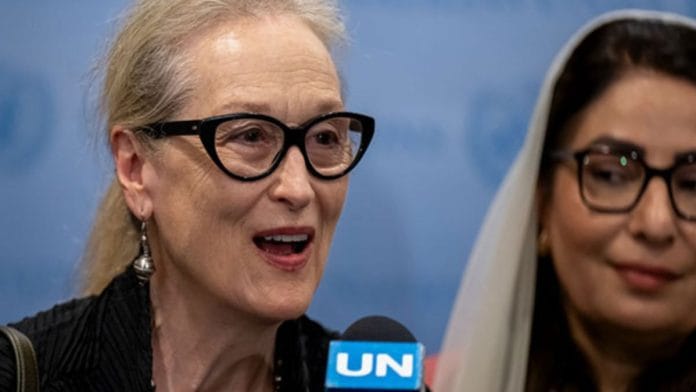Hollywood actor Meryl Streep’s speech on the sidelines of the United Nations General Assembly brought much-needed attention to the plight of Afghan women. “A cat, or a squirrel for that matter, has more freedom than women in Afghanistan,” she stressed, criticising the Taliban’s discriminatory rules and urging the world to step in. However, it doesn’t look like the Taliban is paying attention. Perhaps, as Streep emphasised in her speech, there’s room for more effort from the international community.
The world – including India – needs to understand that the situation in Afghanistan will impact all women and not just Afghan ones. People might believe that their society has no direct connection to the events occurring in faraway lands. They fail to recognise that an outlier like Afghanistan shifts the Overton window, making women’s issues in other countries seem less severe and urgent in comparison. This adds to the rhetorical arsenal of regressive elements, helping them resist efforts for gender equality.
Take this worrying report by ‘Whose Hands on Our Education’, which highlights a global influence campaign by extreme religious groups and political parties to restrict girls’ education. These groups have been specifically targeting schools to counter gender equality and promote patriarchal norms, to nip all progress in the bud. The situation of women in Afghanistan makes these efforts look less threatening and less evil in comparison, forming a confluence that undermines women’s rights across the globe.
Since Taliban-ruled Afghanistan is isolated from the global community diplomatically, economically and culturally, we must think about how appeals such as that of Streep would translate into policy changes. Voices like hers help amplify the issues faced by oppressed women. But is that enough? A country that already doesn’t have democratic processes and is isolated from global interaction needs a lot more.
Influencing an isolated nation
The Taliban government, diplomatically, is not recognised by a majority of nations and faces sanctions and aid restrictions. Nations and international organisations can make agreements in these areas conditional on the re-establishment of women’s position in public life as well as their human rights. The frozen assets of the Taliban can also be made a part of that negotiation.
It might seem that a country as isolated as Afghanistan is immune to economic pressure. Except, it conducts major trade with its neighbouring countries. India, for one, has old ties with Afghanistan and remains the country’s second-largest export market after Pakistan. New Delhi, in cooperation with the international community, can effectively use economic and diplomatic measures to pressure Kabul to ensure human rights and end gender-based discrimination.
Another strategy that could be employed is cultural influence. Yes, in a country where the Taliban regime controls all forms of expression, it is not easy to make inroads into the wider society and wield cultural influence as a means of change. But smartphones and internet access provide Afghans, especially the younger generation, access to global media, which can subtly influence their worldviews and cultural aspirations.
International NGOs and media outlets can create and circulate documentaries and short movies advocating human and women’s rights. They can also amplify the voices of Afghan people living abroad, helping them share their literature, art, aspirations and experiences with a wider global audience. This will give a platform to the Afghan community, particularly Afghan women, to raise their voices and keep alive their fight for a just and fair Afghanistan.
Also read:
Creating a common front for women
One important lesson that can be drawn from Streep’s speech is that a powerful woman in the West can use her influence for the cause of uplifting oppressed Muslim women. This approach transcends national, ethnic and religious boundaries, helping form a common front for all women of the world. When any woman is empowered in any corner of the world, her voice joins a growing choir benefitting womankind and its fight for fundamental rights.
While Streep has done her part using her voice, the international community needs to unite and take urgent action to create a future where every man, woman and child can dare to dream and live a dignified life full of safety and respect. As India takes a central role on the global stage, can it wield its diplomatic, economic and cultural power to make this vision a reality?
Amana Begam Ansari is a columnist and TV news panelist. She runs a weekly YouTube show called ‘India This Week by Amana and Khalid’. She tweets @Amana_Ansari. Views are personal.
(Edited by Zoya Bhatti)






